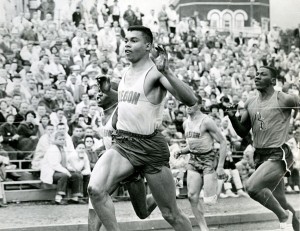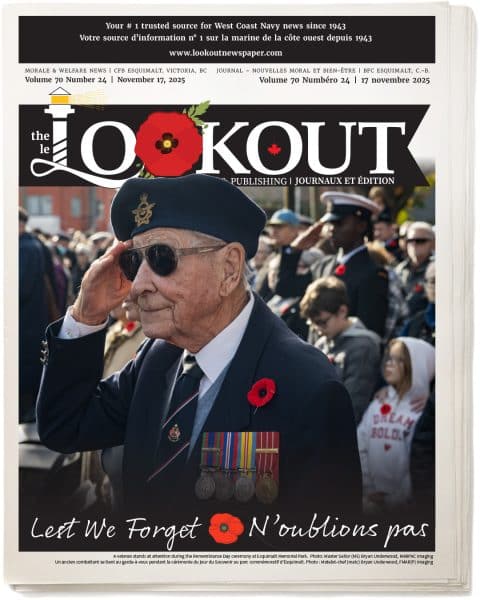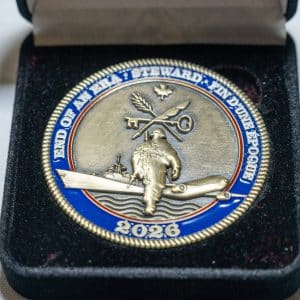
Harry Jerome crosses the finish line at a dual meet with the University of Oregon and Oregon State University, circa 1961.
As Canada celebrates Black History Month and the Year of Sport, the time has never been better to honour the legacies that “Army” Howard and Harry Jerome left to our country, on the track and off.
These outstanding black athletes challenged the discrimination of their times and serve as role models to Canadian youth on the power of believing in yourself.
Canada’s first black Olympian, John “Army” Howard, and his grandchildren, Olympians Harry and Valerie Jerome, leave a legacy of courage to all Canadians.
While the name John Armstrong “Army” Howard may not be familiar to most Canadians, perhaps it should be.
The Winnipeg-raised First World War veteran dominated Canadian sprinting from 1912 to1915. Not only does Howard appear to be Canada’s first black Olympian, he passed on his passion for running to his grandchildren, Olympians Harry and Valerie Jerome.
Howard was born on Oct. 6, 1888. Trained as a mechanic, the tall handsome athlete eventually made his mark on the Canadian scene as a sprinter. Howard easily qualified for the 1912 Olympics held in Sweden, but the path to Stockholm was not smooth. The playing field that was Canadian society in the 1910s was far from level for black Canadians.
“My grandfather headed off to Stockholm enveloped in controversy,” said Ms. Jerome, noting for example the Olympic sprinting team’s coach, Walter Knox, described Howard to the press as outspoken and disobedient. She added that when the Canadian Olympic team mustered in Montreal before setting sail for Stockholm, Howard was barred from staying at the same hotel as the white athletes. In addition, when traveling by boat to Sweden, he was not allowed to eat in the dining room with his white teammates.
In Stockholm, a stomach ailment ultimately derailed Howard’s medal hopes.
Ironically, observed his granddaughter Valerie, all three medal winners of his events had been beaten by Howard at track meets just prior to the 1912 Olympics.
He came back in full force at the Canadian Outdoor Championships in 1913, winning all of his races. Howard also showed his athletic abilities as a catcher for the Crescent Creamery Baseball Club in Winnipeg.
Howard’s athletic career was cut short by the outbreak of the First World War in 1914. He was conscripted into the Canadian Expeditionary Force and began his military service on April 12, 1918, as a private with 1st Depot Battalion, Manitoba Regiment. He served in England, first as a sapper (the Canadian Military Engineers term for those of private rank) with the Canadian Railway Troops, a railway construction unit.
He later transferred to the 11th and 18th Canadian Reserve Battalions, which provided reinforcements for infantry battalions on the continent. Howard ended his deployment with the Canadian Army Medical Corps, most likely serving as a stretcher bearer moving convalescent patients.
In 1920, Howard returned to Canada with his English fiancée Edith Lipscomb and a baby girl who was the first of their three daughters. Married in Winnipeg, the inter-racial couple soon encountered severe prejudice. Valerie Jerome says her grandparents were stoned to drive them out of town when they tried to homestead at Ste. Rose du Lac, north of Winnipeg.
“They didn’t even get their buckboard unloaded and they had this infant daughter with them,” she said.
The Howards finally settled near the Crane River Indian Reserve in Manitoba, though the marriage eventually broke up. The First World War veteran worked as a railway porter and taught boxing until he died of pneumonia in 1937 at the young age of 48.
Howard never got the public acclaim in his lifetime that his accomplishments deserved, but his legacy lives on. He was inducted into the Manitoba Sports Hall of Fame in 2004, and two of his grandchildren, sprinters Harry and Valerie Jerome, were also Olympic competitors.
Harry Jerome’s story bears some striking similarities to his grandfather’s, both in his athletic success and the racist attitudes he encountered. As multi-talented as Howard, Mr. Jerome turned down an offer to play with the Montreal Alouettes football club. He set seven world sprinting records and competed in all three Olympic Games in the 1960s, earning a bronze medal in the 100 metres at the 1964 games.
Despite this success, Valerie Jerome said her brother often faced heavy criticism in the press, particularly when he had to withdraw from the 1960 Olympics 100 metres semi-finals due to a potentially career-ending injury.
Sadly, as his grandfather, Harry Jerome also died young, succumbing in 1982 to a brain aneurism at 42. Mr. Jerome was awarded the Officer of the Order of Canada in 1971 and a star on Canada’s Walk of Fame in 2001. Mr. Jerome’s accomplishments are also remembered by organizations like the Black Business and Professional Association (BBPA), which holds annual Harry Jerome Awards celebrating outstanding achievements in the African-Canadian community.
The BBPA also offers the Harry Jerome Scholarship Fund, providing financial support to African-Canadian youth pursuing higher education. B.C. Athletics offers its own Harry Jerome Scholarship Award for post-secondary education, given to an applicant in financial need with promise in athletics and showing leadership qualities.
Asked what traits her grandfather and her brother may have shared, Ms. Jerome answered, “I think they both had a lot of self-confidence. They had a lot of courage. They went beyond the limits of what they were expected to do.”
Gerry Weaver, Army Public Affairs









